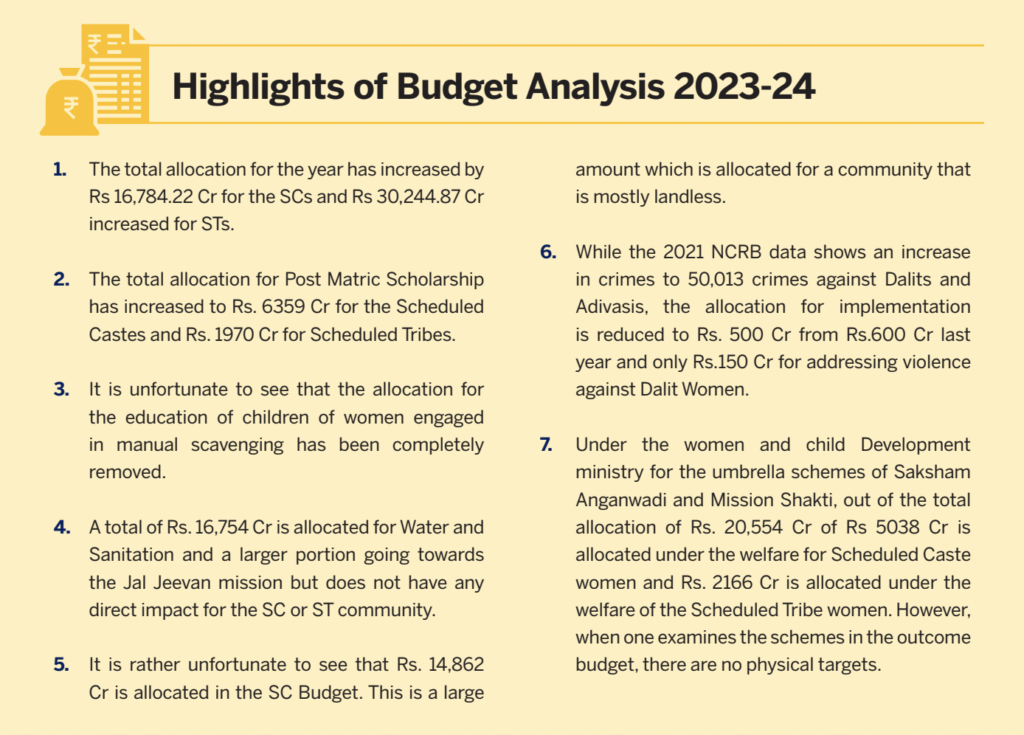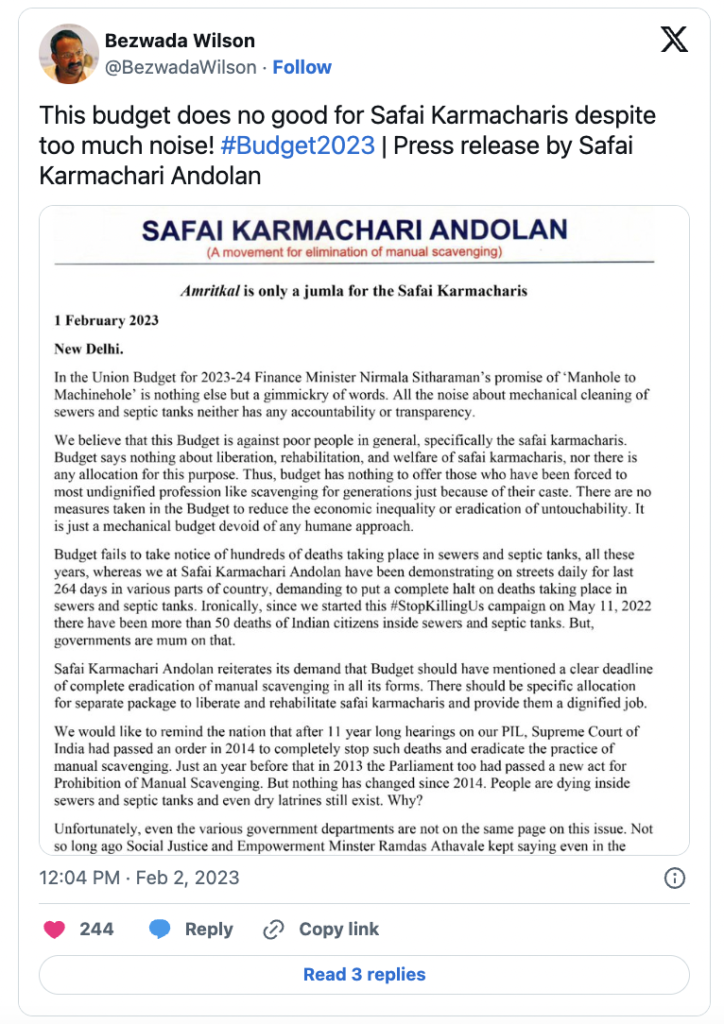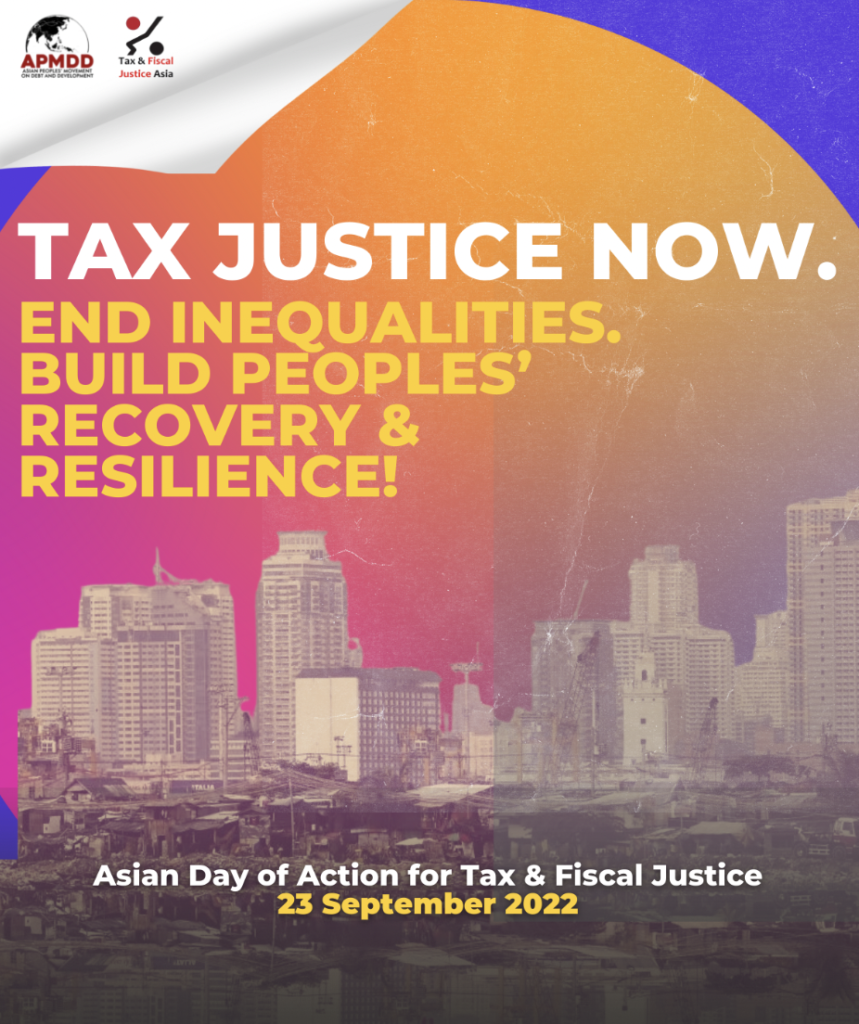
The Dalit and Adivasi Budget Analysis (DABA) provides a thorough analysis of the Union Budget and examines the budget allocation for the Scheduled Castes and the Scheduled Tribes. In 2023, the findings were particularly concerning and newsworthy, as numerous government schemes intended to support these groups have had reduced allocations, while many general schemes are counted as part of the budget for these groups, although they are not directly targeted to them.
Contrary to the commitment to end manual scavenging, no funds were allocated for the rehabilitation of manual scavengers under the self-employment scheme, the scholarship programme for children of people engaged in manual scavenging has been dropped, and the National Safai Karmachari Finance and Development Corporation received a negligible allocation.
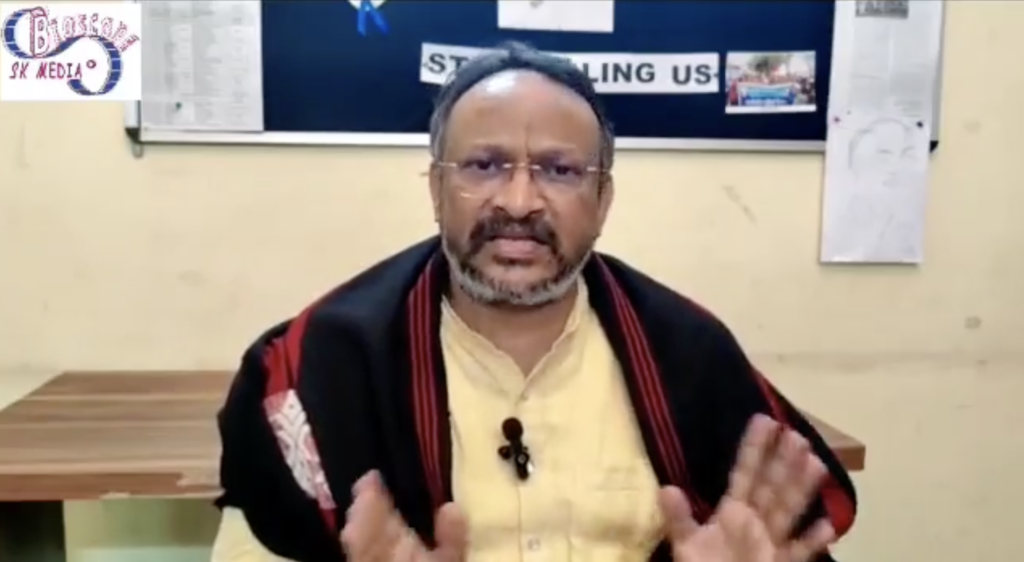
“[The] budget fails to take notice of hundreds of deaths taking place in sewers or septic tanks, all these years, whereas we at Safai Karamchari Andolan have been demonstrating on the streets daily for the last 264 days in various parts of the country, demanding to put a complete halt on deaths taking place in sewers and septic tanks. Ironically, since we started this #StopKillingUs campaign on May 11, 2022, there have been more than 50 deaths of Indian citizens inside sewers and septic tanks. But, governments are mum on that.”
Safai Karamcharis Andolan responded to the Union Budget for 2023-2024 with a press release and a video. The organisation raised the issue of the SRMS (rehabilitation scheme) being removed from the budget and merging with the ‘NAMASTE’ scheme which only allocates budget for producing sewage cleaning machines, but not for the people.
The question was raised of why the human element has been lost and how the people themselves will be supported to step out of this work.
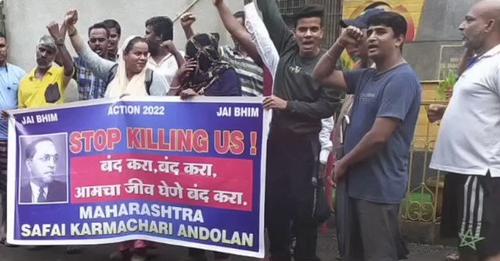
“Casteism and untouchability still decide the social structure in the larger part of the country. For them development is just a superficial myth.”
Members of Safai Karmachari Andolan – a movement of people engaged in or formerly engaged in manual scavenging that spans across India, have been campaigning every day for over 150 days. The campaign, called “Stop Killing Us” aims to bring attention to the often ignored, under-reported issue of deaths of sanitation workers who regularly die from exposure to noxious gases in sewers and septic tanks. This work is carried out by people who feel they have no economic alternative. SKA is calling for contractors and municipalities to take responsibility, for governments to make use of machinery compulsory for such work, and for proper rehabilitation and support to be provided for people to transition to dignified livelihoods with living wages. Read more here and follow the ongoing campaign updates on Twitter here (#StopKillingUs).
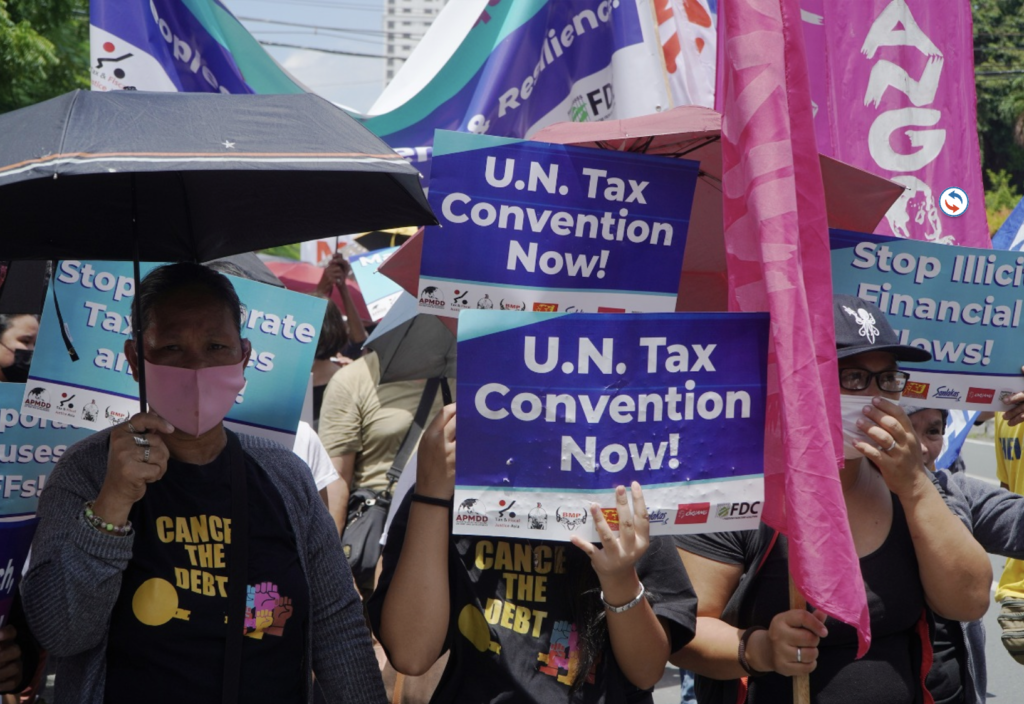

The Asian Peoples’ Movement on Debt and Development (APMDD) welcomes the support of United Nations Secretary-General Antonio Guterres for calls for a UN Tax Convention, recently reiterated by Finance Ministers in Africa and by civil society organizations across the world. This is a step in the right direction towards fixing the fundamental flaws of the international tax architecture and upholds the rights of Global South countries not only to their tax and fiscal sovereignty, but also to raise revenues and rebuild economies in the face of multiple crises that have sharpened under the COVID-19 pandemic.

The Asian Peoples’ Movement on Debt and Development, together with its members at the national level across Asia, carried out the Asia Days of Action – “Tax Justice Now for People’s Recovery” from 23 to 24 September 2022 (click here to watch a video summary).
Multisector groups from Bangladesh, India, and Pakistan took part in days of action, holding seminars, protest actions, solidarity gatherings and photo actions. The groups stressed the urgency to address policies that severely undermine the capacities of people to prepare for, respond to, survive, recover, and rebuild when crisis or natural disasters strike.
Highlights in India included a workshop bringing together CSOs, domestic workers and migrant workers, a puppet show on unjust tax regimes, poster-making by children, and a ‘Ride for a Fair Tax’ that mobilised domestic workers on bicycle.
In Bangladesh, garment workers protested in front of the National Press Club, demanding an end to VAT.
In Pakistan, the Pakistan Fisherfolk Forum organised a rally against injustices in the tax system in Pakistan, and a seminar was held to discuss the need for taxes to work for ordinary people and help deliver public services and much needed relief in light of the floods that struck Pakistan that month.
Click here to read the press release
Click here to watch a video of the Asia Days of Action for Tax Justice 2021

This press release coincides with the launch of the Asia Days of Action on Tax Justice, and highlights actions being taken by APMDD’s partners in Bangladesh, India, Nepal, Pakistan and the Philippines.
The statement demands changes and reforms in tax and fiscal systems, asking governments and the UN General Assembly to take action by ending unjust tax burdens on the poor, fairly and sharply taxing the wealth and income of corporations and the elite and ensuring taxes are used to meet people’s basic needs.
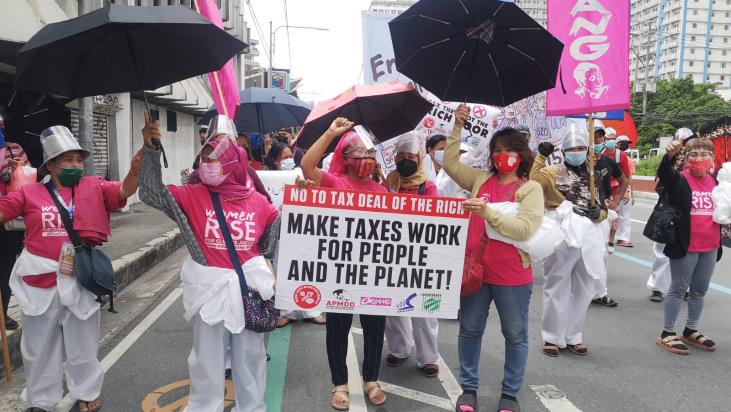
The multiple crises brought to the fore by the pandemic have widened inequalities that had already been present and worsening before the COVID-19 outbreak. Any serious attempt at ensuring peoples’ recovery and addressing inequalities would require bold and decisive actions that strike at the root causes of inequalities and multiple crises.
This is a second press release published by APMDD during the Asia Days of Action, focused on the role of tax systems in addressing inequalities.
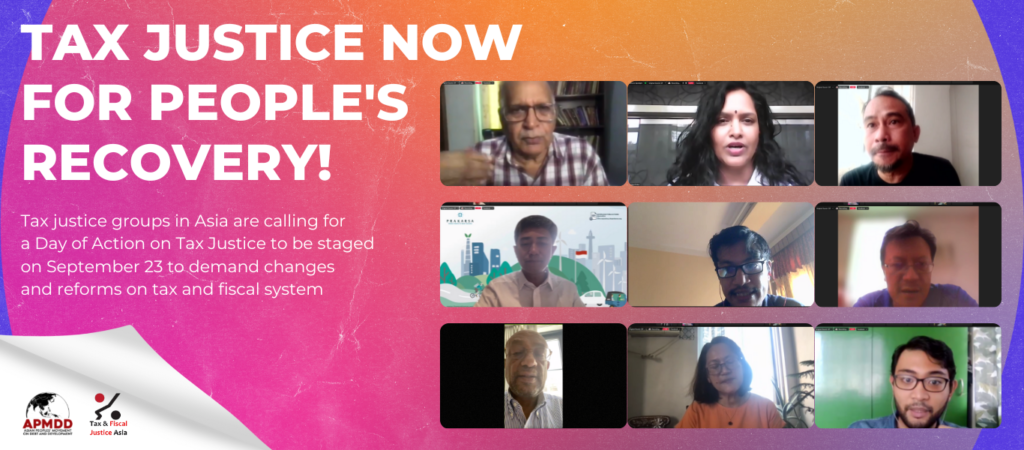

Tax justice groups in Asia are calling for a Day of Action on Tax Justice to be staged on September 23 to demand changes and reforms on taxes and fiscal system with Jeannie Manipon of The Asian Peoples’ Movement on Debt and Development (APMDD) saying that “national tax systems are biased in favor of MNCs and the elites. We can also see the similar pattern in the international tax system”, emphasizing that a progressive mechanism must be put in place in order to allow the removal of the backwards tax and fiscal system.
In an online press conference organized by the Tax and Fiscal Justice – Asia (TAFJA), the combined and resounding messages of speakers stressed that regressive tax policies exemplified by VAT and GST impact women, workers, farmers and other marginalized sectors the most and severely undermine their capacities to prepare for, respond to, survive recover and rebuild when crisis or natural disasters strike. Regressive tax systems, with their elite and gender biases are legacies of colonialism, part of systems that enable countries of the Global North to extract wealth from the Global South.
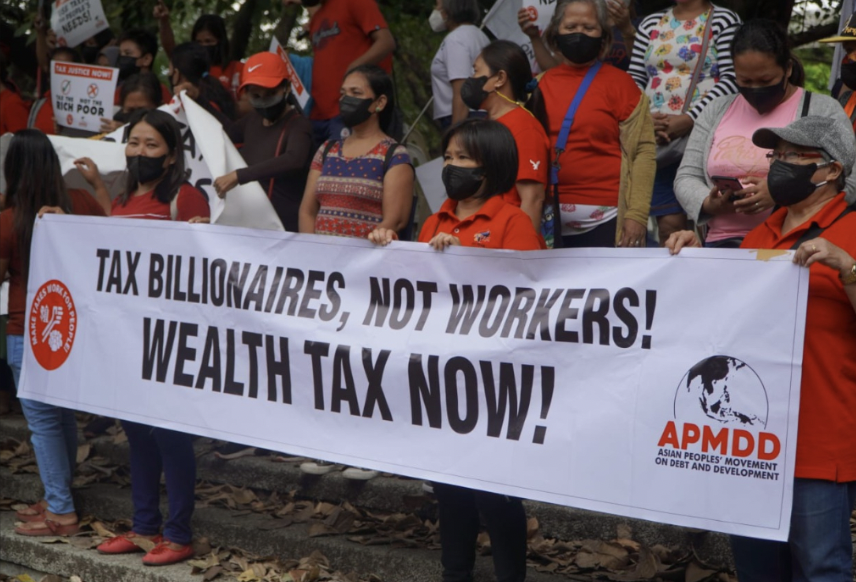
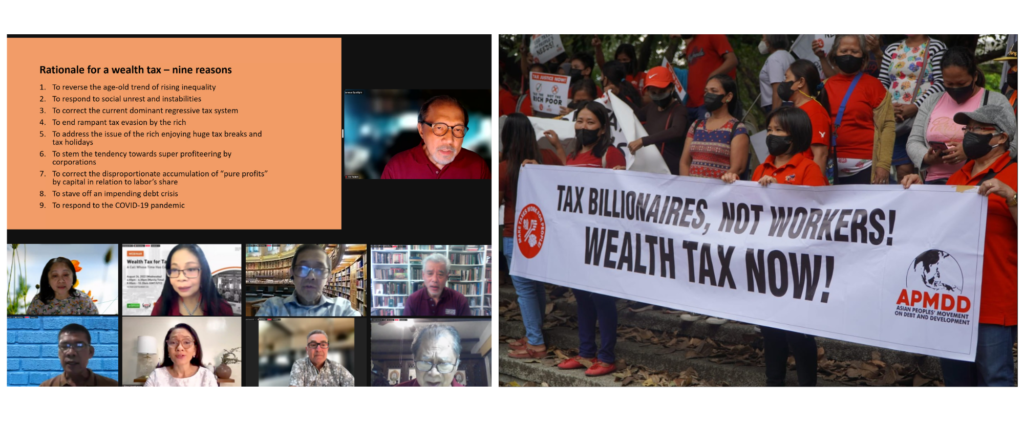
“A wealth tax is a potent tool for equality and justice…. Groups based in the Philippines calling for a wealth tax are advocating for one of the most direct ways to stem inequality by reversing the highly regressive tax system that governments across Asia have long depended on to sustain basic public services. Regressive taxes such as Value-Added Tax (VAT) and excise taxes have long been known to hit those with smaller incomes harder, and have thus helped to widen the gap between poor and rich, women and men, marginalized sectors and influential elites.”
The Asian People’s Movement on Debt and Development held a webinar on 24 August 2022, attended by nearly 300 people to release the findings of the study it commissioned recently on “Inequality, Tax Justice and the Philippine Wealth Tax Campaign”. A press release was issued on the same day, making an appeal for the use of a wealth tax in the Philippines and across Asia. Read more here.


